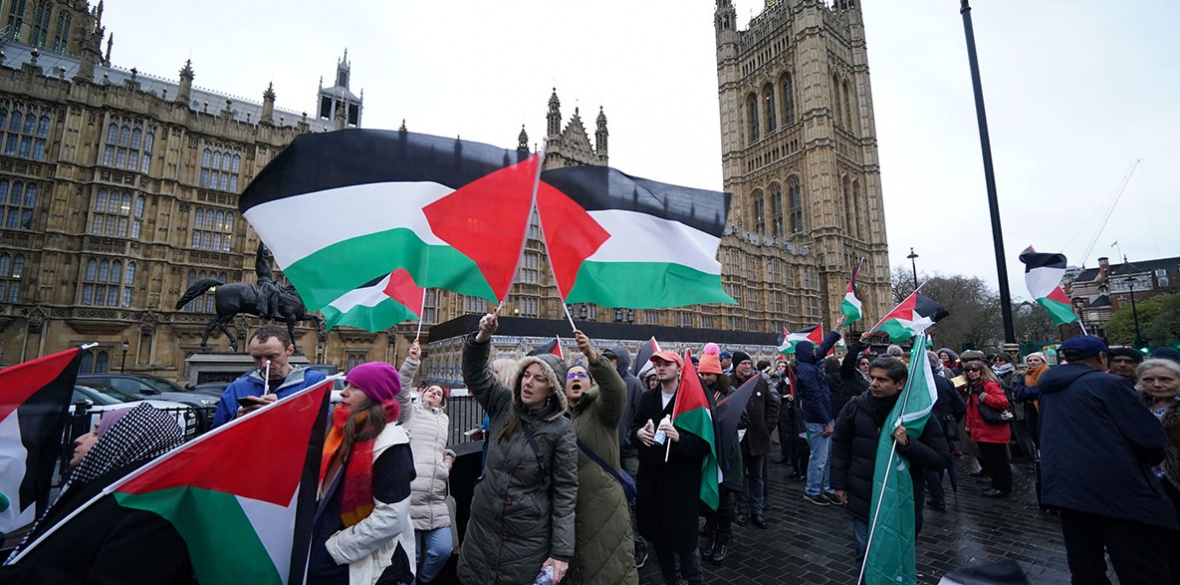This is the last article you can read this month
You can read more article this month
You can read more articles this month
Sorry your limit is up for this month
Reset on:
Please help support the Morning Star by subscribing here
THE Prime Minister’s decision to frame the Speaker’s anti-democratic antics this week as “giving in to extremism” obscures reality.
Lindsay Hoyle’s claim he prioritised a Labour amendment over the SNP ceasefire motion because he was worried about MPs’ safety is a damage limitation bid.
But it chimes with ongoing Establishment propaganda painting peace demonstrators as extremists.
Every crisis of ruling-class legitimacy in recent years has prompted attacks on our democratic rights. Britain is racing towards an authoritarian future, with successive laws empowering police to make arrests on the vaguest grounds (such as causing a “nuisance”) and shut down protests before “disruption” even begins.
The Morning Star has detailed the acceleration of this process since the mass movement for Palestine has again confronted our political elite with the reality that they do not speak for the majority.
Now the idea that protest leaves MPs unsafe is used to justify curtailing democratic processes in Parliament itself. Keir Starmer did not browbeat Lindsay Hoyle into trashing procedures because he was worried about MPs’ safety.
He was trying to avoid the embarrassment of a revolt exposing divisions in his party.
Some MPs have said protesters have threatened their safety since, but not convincingly. Glasgow police rejected Labour MSP Paul Sweeney’s claim that his office was “stormed,” describing instead a peaceful protest. He hit back, saying protesters forced their way into the building, but this account too was disputed by an eyewitness, the Scotsman’s journalist John Devlin.
We’ve been here before. When Jeremy Corbyn led Labour, attempts to press MPs to stop sabotaging their party were repeatedly misrepresented as bullying.
In 2015 the media went wild over an unsubstantiated claim anti-war protesters had targeted MP Stella Creasy’s home after her vote in favour of bombing Syria — a claim Creasy herself later clarified was untrue.
Later the BBC’s Laura Kuenssberg, regularly and rightly challenged over the broadcaster’s distorted reporting on Corbyn (it even had to apologise for her misleading editing of an interview with him), claimed to need personal protection to attend Labour conference — again presenting ordinary activists as a thuggish mob.
Threats of violence must be taken seriously, but loud and angry protest is something any elected politician must be ready to face. Unfortunately, parts of the left have blurred lines between actual threats to people’s safety and merely making arguments that offend or make people uncomfortable — something exploited by the right to devastating effect in Labour’s anti-semitism rows, with the party even banning branch discussion on Corbyn’s suspension on the (absurd) basis it could make people feel unsafe.
The Palestine solidarity movement prompts the same fear that the Corbyn movement did — a threat not to MPs’ physical safety but their power to rule untroubled by the views of ordinary people.
The response, with Labour peer John Woodcock now urging exclusion zones around MPs’ offices, is to dismantle civic rights.
This will have a devastating effect way beyond the Palestine issue. Next weekend’s planned protest in Birmingham over crippling council cuts should be the start of a co-ordinated, union-led campaign to address the looming collapse of local government across Britain.
As with the system failure across essential services — the now regular inability of the NHS to provide GP appointments when needed, of train operators to run scheduled journeys, of Royal Mail to deliver post on time and more — councils are beginning to buckle under the strain of 14 years of punishment.
Labour, tying itself to Tory spending plans, is not going to address any of these crises. Our only hope of changing that lies in the power of protest, the power to make elected politicians aware of the depth of public anger and the consequences of refusing to heed it.
Our whole movement is weakened if we fail to challenge the slander against the peace demonstrations and stand up for our right to confront those in power.











